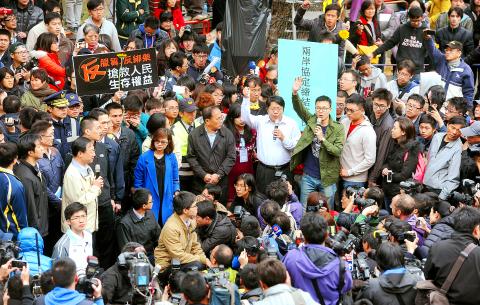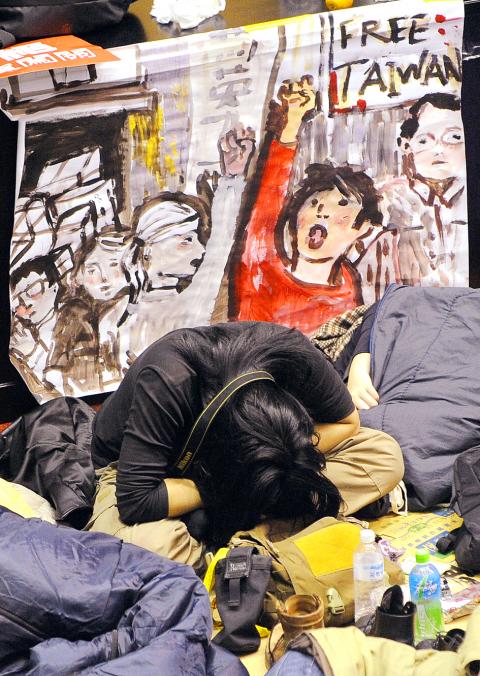Premier Jiang Yi-huah (江宜樺) met with the protesters occupying the legislature to protest the controversial cross-strait service trade pact yesterday — the fifth day of the student-led sit-in — but declined to agree to withdraw the deal or table a law monitoring future cross-strait agreements, saying that these two issues require the Executive Yuan’s and President Ma Ying-jeou’s (馬英九) involvement.
With the number of protesters surrounding the Legislative Yuan complex in Taipei in support of the student-led activists who seized the legislative chamer on Tuesday growing by the thousands each day, the premier yesterday met with protest leader Lin Fei-fan (林飛帆), a graduate student of political science at National Taiwan University, and attorney Lai Chung-chiang (賴中強).
Prior to Jiang’s arrival, Lin told the crowd that the preconditions for dialogue with the premier would be his agreeing to withdraw the service pact — which the Executive Yuan has forwarded to lawmakers for review — from the Legislative Yuan and to draft legislation on monitoring future cross-strait talks and agreements.

Photo: Liu Hsin-de, Taipei Times
“Withdraw the service trade agreement, pass the monitoring legislation,” demonstrators chanted as Jiang walked through the crowd escorted by police officers to reach the side gate of the Legislative Yuan building, where Lin and Lai were waiting.
Jiang began by dismissing rumors that the Executive Yuan has asked National Taiwan University Hospital — which is close to the legislature building — to make preparations to take in a large number of wounded as it is planning to clear the legislative floor by force.
“I’m saddened to hear these rumors, because they are baseless,” Jiang said. “The Executive Yuan has no plan to remove anyone by force and will fully respect the legislature’s prerogative to handle the situation in its own way.”

Photo: Chen Chih-chu, Taipei Times
However, the crowd was dismayed when Jiang said that the Cabinet supports the legislature’s article-by-article review of the agreement, but will not take withdraw the pact because it is “beneficial for the liberalization of the economy.”
He said there is no need to enact new laws to monitor cross-strait agreements since “the governing party [the Chinese Nationalist Party (KMT)] has already proposed measures pertaining to the monitoring of such agreements by the legislature and the public that are supported by Legislative Yuan Speaker Wang Jin-pyng (王金平). Therefore, there is no need for new legislation.”
The crowd of demonstrators voiced its displeasure at the premier’s remarks by reiterating the demands, but Jiang responded that this was not a decision he could take unilaterally.
“The last thing I want to say is that the two issues you [the protesters] are concerned about not only involve the Executive Yuan, but also President Ma Ying-jeou,” Jiang said.
“We’ve all heard what the premier said, so let’s unite to call on the president to take care of the issue,” Lin replied, as the crowd started chanting for Ma to “come forward and face the matter.”
After Jiang declined to agree to the two preconditions for dialogue with Lin and Lai, the crowd thanked the premier for his time and clapped to ask him to leave.
Later yesterday, Jiang called a press conference at the Executive Yuan and read out a statement addressed to the students.
He said he was happy to see young people voicing their views on issues concerning the nation’s future, but felt sad about and could not agree with their occupying the legislative chamber and behaving in a disorderly manner.
Jiang added that his visit to the site of the protest had been approved by Ma in advance and said he regretted that the students had not given him a chance to discuss with them what he said were their “misunderstandings” of the service trade pact based on “misleading information and rumors” just because he had not agreed to the preconditions.
“There should be no premise or preconditions for talks so we can have some space for rational communication,” Jiang said.
The premier again dismissed concerns over the potential negative impacts the trade pact would have on the nation and the lack of consultations with concerned parties before it was signed.
The movement against the trade pact was attributed to opponents’ “anti-China mindsets” that made them “oppose everything related to China,” Jiang added.
“It’s not because there was anything wrong with the agreement itself or the negotiations [with China], but because of the ‘anti-China mindset,’” Jiang said, adding that this stance would render “Taiwan incapable of reaching out to the world,” as well as “cause huge damage to the country’s future.”
He called on the students to disoccupy the legislative chamber as quickly as possible since it is a “sacred and solemn” place, the law-making supremacy of which has been established by the efforts of the countless people who fought for Taiwan’s democratization.

DAREDEVIL: Honnold said it had always been a dream of his to climb Taipei 101, while a Netflix producer said the skyscraper was ‘a real icon of this country’ US climber Alex Honnold yesterday took on Taiwan’s tallest building, becoming the first person to scale Taipei 101 without a rope, harness or safety net. Hundreds of spectators gathered at the base of the 101-story skyscraper to watch Honnold, 40, embark on his daredevil feat, which was also broadcast live on Netflix. Dressed in a red T-shirt and yellow custom-made climbing shoes, Honnold swiftly moved up the southeast face of the glass and steel building. At one point, he stepped onto a platform midway up to wave down at fans and onlookers who were taking photos. People watching from inside

A Vietnamese migrant worker yesterday won NT$12 million (US$379,627) on a Lunar New Year scratch card in Kaohsiung as part of Taiwan Lottery Co’s (台灣彩券) “NT$12 Million Grand Fortune” (1200萬大吉利) game. The man was the first top-prize winner of the new game launched on Jan. 6 to mark the Lunar New Year. Three Vietnamese migrant workers visited a Taiwan Lottery shop on Xinyue Street in Kaohsiung’s Gangshan District (崗山), a store representative said. The player bought multiple tickets and, after winning nothing, held the final lottery ticket in one hand and rubbed the store’s statue of the Maitreya Buddha’s belly with the other,

‘NATO-PLUS’: ‘Our strategic partners in the Indo-Pacific are facing increasing aggression by the Chinese Communist Party,’ US Representative Rob Wittman said The US House of Representatives on Monday released its version of the Consolidated Appropriations Act, which includes US$1.15 billion to support security cooperation with Taiwan. The omnibus act, covering US$1.2 trillion of spending, allocates US$1 billion for the Taiwan Security Cooperation Initiative, as well as US$150 million for the replacement of defense articles and reimbursement of defense services provided to Taiwan. The fund allocations were based on the US National Defense Authorization Act for fiscal 2026 that was passed by the US Congress last month and authorized up to US$1 billion to the US Defense Security Cooperation Agency in support of the

‘COMMITTED TO DETERRENCE’: Washington would stand by its allies, but it can only help as much as countries help themselves, Raymond Greene said The US is committed to deterrence in the first island chain, but it should not bear the burden alone, as “freedom is not free,” American Institute in Taiwan Director Raymond Greene said in a speech at the Institute for National Defense and Security Research’s “Strengthening Resilience: Defense as the Engine of Development” seminar in Taipei yesterday. In the speech, titled “Investing Together and a Secure and Prosperous Future,” Greene highlighted the contributions of US President Donald Trump’s administration to Taiwan’s defense efforts, including the establishment of supply chains for drones and autonomous systems, offers of security assistance and the expansion of